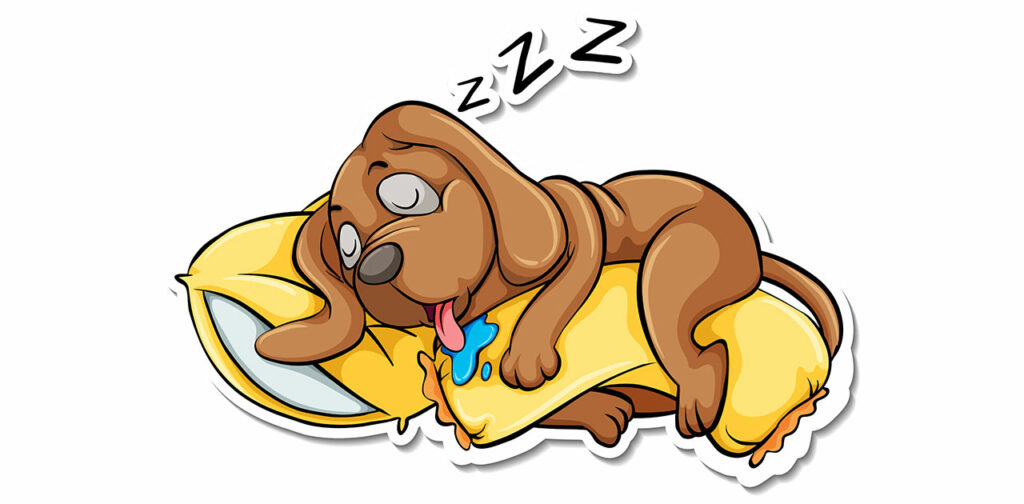Why is my puppy breathing fast while sleeping? Is it something to worry about? Read ahead as we will give you the information which will help you take an informed decision.
So, has your adorable little furball ever lulled you into a sense of calm with their gentle snores, only to jolt you awake with their rapid, shallow breathing moments later?
We understand. It’s enough to send any puppy parent’s heart racing!
But before you reach for the emergency vet number, take a deep breath (pun intended) and let’s explore the 12 most common reasons why your puppy might be breathing fast while sleeping.

Puppy Breathing Fast While Sleeping: 12 Reasons Why
Before we proceed any further, we want you to understand that this blog is for informational purposes only and should not be taken as a substitute for professional veterinary advice. Always consult with your veterinarian if you have any concerns about your puppy’s health.
1. Normal Puppy Breathing
While adult dogs breathe comfortably at 12-30 breaths per minute, puppies, like toddlers, are little engines! Their faster breathing rate of 15-50 breaths per minute simply reflects their higher metabolism and growth processes.
So, if your puppy’s breathing seems quick but rhythmic while they snooze, it’s likely just their natural engine purring away.
2. Dreamland Adventures
Get ready for adorable twitches and whimpers! Just like humans, puppies have dreams, and during REM sleep, their brains go on exciting adventures. This heightened activity can cause their breathing to increase, mimicking the physical exertion of running or chasing squirrels in their slumber.
Don’t worry, you’re not waking them from a nightmare – just observing their tiny paws chase imaginary butterflies!
3. Recent Exercise
Remember that energetic fetch session in the park? It takes time for those little legs to wind down! Puppies’ bodies take a while to adjust after exertion, so their breathing might remain elevated for a while as they cool down and replenish their energy.
Just like you wouldn’t expect to fall into a deep sleep right after a sprint, don’t be alarmed if your pup’s breathing is a bit faster after playtime.
4. Warm Weather
Imagine being bundled up in a thick blanket on a summer day – not exactly cool and comfy! Similarly, hot environments or snuggling under heavy blankets can make puppies pant to regulate their body temperature. If their surroundings are warm, try offering refreshing water or moving them to a cooler spot to help them settle into a comfortable sleep.
5. Pain or Discomfort
Rapid breathing while sleeping can sometimes be a red flag. If your puppy exhibits other symptoms like lethargy, loss of appetite, or excessive licking, it could indicate an underlying illness or injury causing them discomfort.
Watch for vocalizations like whining or whimpering, specific areas of licking or chewing, limping, unusual postures, and changes in sleeping patterns. These additional clues could point to pain in a specific location like the abdomen (digestive issues), joints (arthritis), or skin (allergies or infections).
If the symptoms are sudden and severe, or if your puppy seems distressed, don’t wait for a vet appointment. Seek immediate medical attention, as it could be a sign of a life-threatening condition.
Be observant and consult your veterinarian if you notice these combined signs.
6. Respiratory Issues
Coughing, sneezing, and nasal discharge are telltale signs of respiratory issues like infections or allergies. A dry, hacking cough might indicate kennel cough (infectious tracheobronchitis), while a wet, productive cough could suggest pneumonia.
Wheezing often points to allergic bronchitis or other airway inflammation. Fever, nasal discharge (clear, thick, or discolored), difficulty breathing, and enlarged lymph nodes can further support a respiratory issue diagnosis.
If your puppy’s rapid breathing is accompanied by these symptoms, a vet visit is recommended to rule out any underlying complications and ensure proper treatment.
7. Parasites
Those wiggly worms in your puppy’s tummy aren’t just freeloaders – they can steal vital nutrients, impacting their energy levels and oxygen intake. Look for signs like pale gums, anemia, and a dull coat. Different types of parasites present different symptoms; roundworms might cause vomiting and bloating, while hookworms can lead to bloody diarrhea.
Watch for signs like weight loss, diarrhea, or a pot-bellied appearance, and consult your veterinarian for parasite testing and treatment if needed. Regular grooming and deworming as per your veterinarian’s recommendation can prevent parasite infestations and their associated health problems.
8. Heart Problems
While less common, certain congenital heart conditions can affect breathing in puppies. Observe if there is anything beyond rapid breathing and persistent coughing. Listen for unusual heart sounds like murmurs or gallops. Excessive panting, even at rest, and fainting episodes are also concerning signs.
Early diagnosis is crucial here. Heart conditions in puppies can be managed effectively with proper medication and treatment, so prompt veterinary evaluation is vital.
If you suspect a heart issue based on rapid breathing, persistent coughing, or lethargy, consult your veterinarian for a thorough evaluation and specialized care.
9. Anxiety or Stress
New environments, loud noises, or even separation anxiety can trigger stress in puppies, leading to faster breathing. Observe the triggers first. This will provide you enough information to take actions on.
New environments, loud noises, separation anxiety, or even rough play can trigger stress in puppies. Pay attention to situations that seem to make them anxious and avoid or manage those triggers.
So, what can you do here? Simple: provide enough comfort and security.
Create a safe space like a crate or cozy bed, offer calming toys or chews, and establish a predictable routine with regular feeding times and walks so there’s no surprises for you little pup.
Over time, s/he will adjust to it and then you can start introducing new things. But do it slowly and give them enough time to get comfortable with it.
But remember, positive reinforcement and training can also help build confidence and reduce anxiety. Consider them if your pup is a bit slow to adjust.
10. Poisoning
If you suspect your puppy has ingested something toxic, don’t wait for symptoms to appear. Act fast! Immediately contact your veterinarian or animal poison control center for guidance and potentially life-saving measures.
Knowing the suspected toxin (plant, household product, etc.) can help the vet determine the best course of treatment. For the uninitiated among us, you’ll be surprised to know as to how many things we usually always have in our home are toxic to dogs. If consumed, even small amounts of these items can be fatal.
Some of these are:
- Beer: Forget sharing your beer with your four-legged friend. Even a sip of alcohol can wreak havoc on a dog’s system. Sickness, diarrhea, and even nervous system damage are just a few nasty consequences.
- Products that Contain Xylitol: Sugar-free? Not for your pup. Xylitol, a common sweetener in our diet products, acts like a poison for dogs. Hypoglycemia, liver failure, and even blood clotting issues can occur if they ingest it. Keep those sugar-free goodies far from reach!
- Chocolate: Chocolate is another delightful danger for pups. There is a stimulant called theobromine in chocolate, especially in the dark chocolate varieties, and it is poison for dogs. Kidney failure is a real possibility, so resist the urge to share!
- Grapes and Raisins: Grapes and raisins are like ticking time bombs for dogs. Even a small amount can trigger severe liver damage and kidney failure. Don’t let your furry friend fall victim to these sweet treats!
- Avocado Plants: Yep, it is a bit surprising. From the leaves to the seed, every part of the avocado plant contains Persin, a tummy troublemaker for dogs. Vomiting and diarrhea are the likely culprits if your pup takes a bite.
- Macadamia Nuts: Macadamia nuts are party poopers for pets. These tasty treats pack a hidden toxin that messes with your dog’s muscles and nerves. Weakness, swollen limbs, and panting are the uninvited guests at this toxic party.
- Onions: Beware the onions too. Whether dried, raw, or cooked, onions, garlic, and chives are toxic to dogs, causing stomach upset and damaging red blood cells. The worst part? Symptoms might not show up for days, making it sneaky and dangerous.
11. Hypoglycemia
In young puppies, especially small breeds, low blood sugar can progress rapidly and become life-threatening. If you notice rapid breathing, lethargy, and weakness, call your veterinarian or rush them to an emergency clinic.
What can you do to prevent it? Ensure regular feeding, especially for young puppies, and avoid skipping meals. Offer readily-digestible snacks like honey or corn syrup as a temporary measure if hypoglycemia is suspected.
12. Allergic Reactions
Food allergies or environmental triggers can cause inflammation in your puppy’s airways, leading to rapid breathing, wheezing, and other respiratory distress. But look for anything beyond these symptoms as well. Watch for itchy skin, red or watery eyes, sneezing, and facial swelling.
Different allergens trigger different symptoms, so identifying the culprit is essential for proper management.
If you suspect allergies, consult your veterinarian for testing and proper allergy management strategies. Your veterinarian can perform allergy tests to identify the specific trigger and recommend appropriate treatment, such as medication, dietary changes, or environmental control measures.

Is it Normal for a Puppy to Breathe So Fast When Sleeping?
While some rapid breathing during sleep is normal, especially in short bursts, prolonged or excessive panting can be a sign of an underlying issue.
As we have discussed in the blog, if your puppy’s breathing is accompanied by other concerning symptoms, consult your veterinarian for a proper diagnosis and treatment plan.
Conclusion
As we discussed in our blog, not every puppy breathing fast while sleeping is in danger. Remember, every puppy is different, and understanding their normal baseline behavior is key to identifying any potential problems.
By observing your pup’s breathing patterns and being mindful of other symptoms, you can ensure their precious sleep remains peaceful and worry-free. And if you’re ever in doubt, don’t hesitate to consult your veterinarian for expert advic





